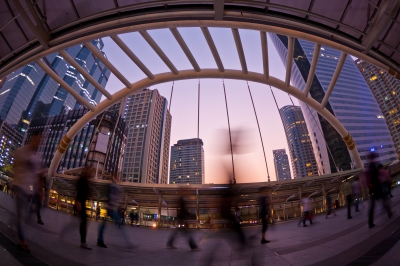The Church has left the building
Reflecting on when an area learns to live without a church. By Michael Shaw
Devonport used to have so many Baptist churches that in 1921 one of them felt it was time to leave to a new area of the city. Come 1939 there were three thriving Baptist churches, several Methodist churches and a number of working Anglican parishes. World War Two changed all that.
Devonport was one of the key dockyards and an obvious target for German bombing. The area was decimated, and after the war the Navy extended the dockyard.
Within 15 years, there were no Baptist or Methodist churches, and only one solitary Anglican church. The Church had left the area!
There remained one or two independent churches for a number of years.
However, by the time Devonport Community Baptist Church was planted in 1999, only the Anglican church of St Aubyn’s remained, with its small and dwindling population (St Aubyn’s is now a library with a small worship space hidden away on a mezzanine floor)
What impact does that have on an area? I have been reflecting a lot on this recently, and I've realised one of the key points is that people learn to live without the church.
Now this may be a good thing... perhaps a post-Christendom reading would say that the church is now in a place to truly connect with the community through the removal of its source of power (buildings)?
Maybe that is true. But an area that has lost its connection with the church is also a hard place to minister in. They have discovered that they do not need the church, the church has done nothing for them, and they have no connection with it.
You are not a stakeholder in the community. When I arrived the local head teacher, when I asked what how the church could help the school, simply replied “not really”. The conversation moved on and I am now a governor at the school, but that response is not untypical: this is an area that has learnt to live without the church. The answer to the question “How can we help?” is “No thanks”.
 The problem is that Devonport is not alone in being an un-churched area of a city; there are many places in our cities and rural areas where the church does not exist, and may not ever exist again.
The problem is that Devonport is not alone in being an un-churched area of a city; there are many places in our cities and rural areas where the church does not exist, and may not ever exist again.
My real fear is that in 20 years time areas like Devonport will not have a Baptist church again, and many areas of the UK will be the same. Baptist churches will only exist in middle class or suburban areas, and will be large churches which can afford a minister (or two – or sometimes three).
If you want to engage with a Baptist church, you will have to travel. More and more areas will find that the church has nothing to offer them, because they have discovered they can live without them.
How can this bleak picture change? The answer is that we need a movement of the Spirit, but not in a revival whereby we all gather in church buildings or warehouses and sing songs and fall over, but a revival in the idea of incarnation.
In being sent, in joining with the sending God, seeing people start to live, work and worship in areas where they are uncomfortable, where the worship is not a show, where life is real, where people are real, where they have to live sacrificially, where their lives are not dominated by school catchment areas.
We need a revival in incarnation. Only then will people see that the church is for them, and not distant and disinterested in them.
The Revd Michael Shaw is minister of Devonport Community Baptist Church, Plymouth
Picture: Witthaya Phonsawat/freedigitalphotos.net
Baptist Times, 16/04/2015